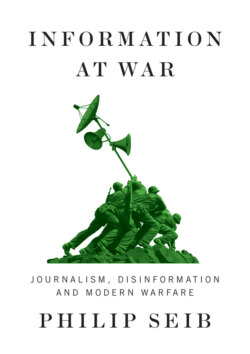Читать книгу Information at War - Philip Seib - Страница 8
Notes
Оглавление1 1 Homer, The Iliad, translated by Robert Fagles (London: Penguin, 1998), 77.
2 2 Journalism, “Fake News,” and Disinformation: A Handbook for Journalism Education and Training, UNESCO, 2020, https://en.unesco.org/node/295873.
3 3 Committee to Protect Journalists, https://cpj.org/data/imprisoned/2019/?status=Imprisoned&start_year=2019&end_year=2019&group_by=location.
4 4 See Stanley Cloud and Lynne Olson, The Murrow Boys (Boston: Houghton Mifflin, 1996).
5 5 Melissa A. Wall, “Blogs over Baghdad: A New Genre of War Reporting,” in Ralph D. Berenger (ed.), Cybermedia Go to War (Spokane, WA: Marquette Books, 2006), 297–8.
6 6 Henry Kissinger, Does America Need a Foreign Policy? Toward a Diplomacy for the 21st Century (New York: Simon & Schuster, 2001), 284.
7 7 See Peter Braestrup, Big Story (abridged version: Novato, CA: Presidio Press, 1994).
8 8 Dominique Moisi, “The Clash of Emotions,” Foreign Affairs 86, no. 1 (January–February 2007), 8.
9 9 Kate Bulkley, “The Rise of Citizen Journalism,” Guardian, June 10, 2012.
10 10 Philip Seib, Headline Diplomacy: How News Coverage Affects Foreign Policy (Westport, CT: Praeger, 1997), 1–13.
11 11 See Laura J. Ahlstrom and Franklin G. Mixon, Jr. (eds.), War Movies and Economics: Lessons from Hollywood’s Adaptations of Military Conflict (London: Routledge, 2020).
12 12 Fiona Macdonald, “Mrs. Miniver: The Film that Goebbels Feared,” BBC, February 9, 2015, www.bbc.com/culture/article/2150209-the-film-that-goebbels-feared.
13 13 Marvin Kalb, Imperial Gamble: Putin, Ukraine, and the New Cold War (Washington: Brookings Institution, 2015), 236.
14 14 www.medialit.org/media-literacy-definition-and-more.
15 15 https://americancentury.omeka.wlu.edu/files/original/60e94905a0e02050a5b78f10b1b02b07.jpg.
16 16 See William Prochnau, Once Upon a Distant War (New York: Times Books, 1995).
17 17 Philip Knightley, “The Falklands: How Britannia Ruled the News,” Columbia Journalism Review, September/October 1982, 52.
18 18 Bob Woodward, The Commanders (New York: Pocket Books, 1992), 364.
19 19 See Philip Seib, Beyond the Front Lines: How the News Media Cover a World Shaped by War (New York: Palgrave Macmillan, 2004), 69–86.
20 20 Julie Salamon, “New Tools Make Coverage More Instant but Coverage No Simpler,” New York Times, April 6, 2003.
21 21 Seib, Beyond the Front Lines, 58.
22 22 Seib, Beyond the Front Lines, 78–9. Mark Jurkowitz, “Americans Want Facts and Flags,” Boston Globe, July 14, 2003, http://forums.lukpac.org/viewtopic.php?t=230.
23 23 www.bbc.co.uk/send/u16904890.
24 24 Lilie Chouliaraki, “Citizen Voice in War and Conflict Reporting,” in Piers Robinson, Philip Seib, and Romy Froehlich (eds.), Routledge Handbook of Media, Conflict and Security (London: Routledge, 2017), 174–5.
25 25 See Martin Bell, In Harm’s Way (London: Penguin, 1996).
26 26 See Abdel Bari Atwan, Islamic State: The Digital Caliphate (Oakland: University of California Press, 2015).
27 27 www.pewresearch.org/internet/2018/11/16/algorithms-in-action-the-content-people-see-on-social-media.
28 28 See Henry Hemming, Agents of Influence: A British Campaign, a Canadian Spy, and the Secret Plot to Bring America into World War II (New York: PublicAffairs, 2019).
29 29 See Thomas Rid, Active Measures: The Secret History of Disinformation and Political Warfare (New York: Farrar, Straus and Giroux, 2020).
30 30 Lawrence Freedman, Ukraine and the Art of Strategy (New York: Oxford University Press, 2019), 140.
31 31 Julian E. Barnes, “Cyber Command Operation Took Down Russian Troll Farm for Midterm Elections,” New York Times, February 26, 2019.
32 32 Jens Stoltenberg, “NATO Will Defend Itself,” NATO, August 29, 2019, www.nato.int/cps/en/natohq/news_168435.htm?selectedLocale=en.
33 33 Adam Nicolson, Why Homer Matters (New York: Henry Holt, 2014), 181.
